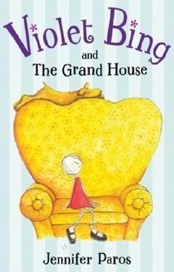Think More Like You: Acts of Authenticity, Fear, and the Wonderful Truth about Us
by Jennifer Paros
“We are constantly invited to be who we are”
Thirty plus years ago I was hired part-time as a “Mother’s Helper” for a six-year-old I’ll call Sparky. She was a beautiful, sweet girl with blond ringlets. Her mother, whom I’ll call Joanne Brimmerman, described her as an “angel” during my interview. Mrs. Brimmerman was very nice. The position included dusting and vacuuming, tidying/light cleaning the kitchen, tending to recycling, grocery shopping, picking Sparky up from school and taking her to lessons and/or play dates with friends.
The weeks and months that followed didn’t go particularly well. Mrs. Brimmerman often seemed stressed and overly concerned. I was feeling less and less like myself, increasingly preoccupied with trying to please Joanne and follow her directives. Sparky had disdain for rule-following and I soon felt bullied by her resistance and determination to buck the system. I liked Joanne, but I was trying to please a worried person and had lost my joy in the process. I could not figure out how to implement her agenda and have fun with Sparky. I was trying so hard that most of my actions were strained – something both Sparky and I couldn’t stand. Eventually, I was so unhappy, I quit. I broke my promise to the family; I disappointed myself; and worst of all, I had come to greatly dislike both Sparky and me.
When I gave notice, Mrs. Brimmerman was very upset. They had been counting on a year-long commitment. It was then she confessed that Sparky had never wanted me for the job; her parents had chosen me against her wishes. Also, she’d adored her previous nanny – a young woman who had, apparently, gone rogue, covertly defied Mrs. Brimmerman on a regular basis, and been a great deal of fun. Sparky missed this nanny greatly, though Joanne did not.
Sparky and I both wanted the same thing: to have fun and be happy – yet together we failed. At the time, I couldn’t figure out how to make the situation better. I needed to allow myself to think more like me and was afraid to do so. I was afraid of failing; I didn’t realize the terms of my success or failure could only be defined by me.
“Seek out that particular mental attribute which makes you feel most deeply and vitally alive, along with which comes the inner voice which says, “This is the real me,” and when you have found that attitude, follow it. ”
In the documentary The Zen Diaries of Garry Shandling, we learn that comedian Garry Shandling would often write in his journals about wanting to be “more Garry.” His goal, the only goal, was to be more himself on stage and in his daily life. He knew that if he could just allow his authentic self to lead, the humor would be there, and so would everything else he wanted.
A big part of why I love writing is because when I write, my intention is to think and see as much like me as possible, and go wherever that takes me. That’s an authentic adventure. The more accurately I translate what I actually think (not conventional or habitual thought) the better. Thought that is faithful to who we really are feels liberating. It’s the product of an unshackled state of mind – open enough to be unabashedly genuine, generous, and insightful.
When my youngest son was in elementary school, standardized tests were administered to the students annually. Though he was on the autism spectrum and couldn’t sit effectively for such extensive testing, he was included. Later, we’d receive his scores and I was often afraid to look at them. I wasn’t afraid they’d reveal some terrible truth about my son, I was afraid they would completely disregard the wonderful truth about my son. The test results were true on one level and it is there that I left them; they just weren’t true on enough levels to make them important. It was my job to discern this – by thinking more like me, and not just mimicking conventional thought.
The moment we align with our own true thinking, fear drops away. This lining up is success. It’s when we become comfortable in our skin, clear on how to make our current role our own, clear on what our only real job is: to think and be more like us.
Jennifer Paros is a writer, illustrator, and author of Violet Bing and the Grand House (Viking, 2007). She lives in Seattle. Please visit her website.

